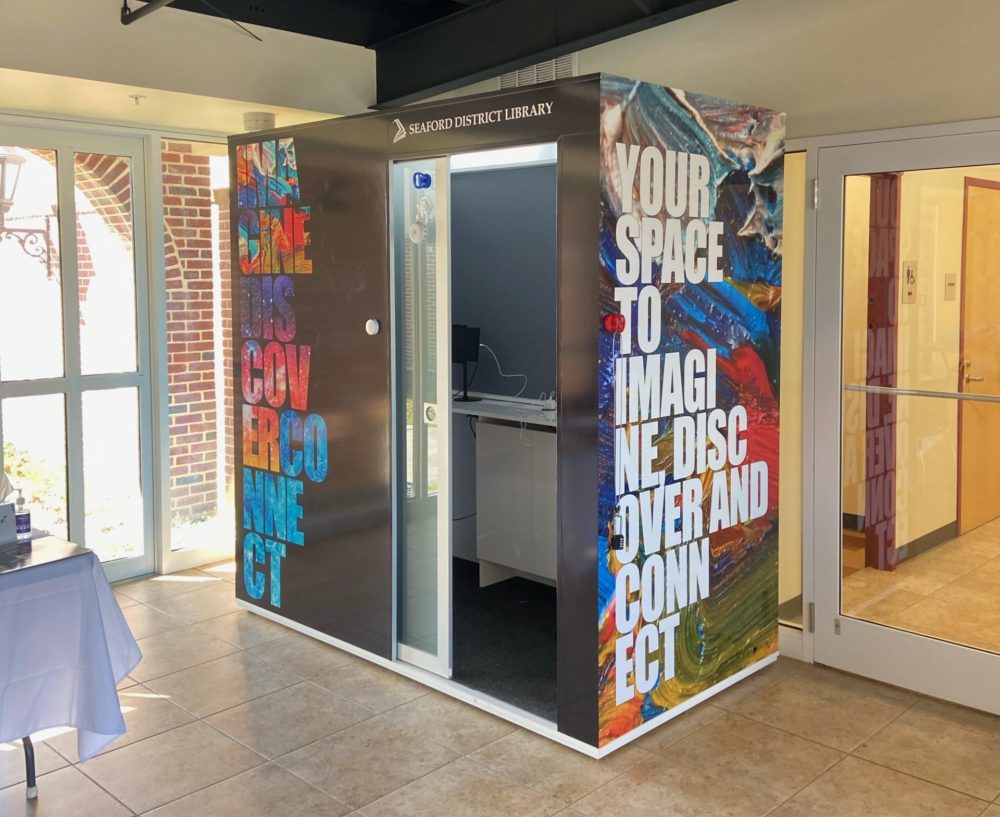Delaware Libraries have evolved with the times, adapting to the rise of ebooks and focusing on the varying needs of the communities they’re in. That includes offering career and entrepreneur services, and lending a makerspace to help make face shields at the height of the COVID-19 PPE shortage as well as on Election Day.
The newest offering, launched today in three Sussex County libraries, are telehealth kiosks: Community members can come and receive safe, private virtual medical care, therapy sessions, or even things like job interviews, meetings with lawyers or immigration support.
Nick Martin, emerging technology consultant for Delaware Libraries, has been developing the project for several years now.
“This started as part of my Americorps VISTA project,” he said. “I came on board with the Libraries back in 2017, focused on STEM and emerging technology. I was looking at artificial intelligence and virtual reality, and how the libraries could leverage that. Telehealth came about because we have a pretty strong track record of access to social services in the Libraries, starting with the ’08-’09 job crisis, when [Delaware Libraries’ Statewide Social Innovator] Alta Porterfield spearheaded the jobs center.”
Then, around 2012, Delaware Libraries partnered with Delaware Health and Social Services (DHSS) to put social workers into the libraries.
“Pre-COVID we had 22 libraries with social workers,” said Martin. “We have a strong history there. There’s a behavioral health crisis happening. There’s a digital access crisis. And we have COVID, which is this proof of concept for telehealth. The kiosks are part of a larger initiative for better access to health and social services and technology.”
Martin says that, according to his research, this pilot project is the first library-led telehealth initiative in the country. The first three libraries to have the kiosks are Seaford Library, which is considered the hub for the pilot, as well as Milford Library and Laurel Library.
The kiosk program will expand throughout the state, starting this summer. Why start with these Sussex County locations?
“I’m a data guy and engineer by training,” said Martin. “The DHSS put out this heat map about behavior health specialists in Delaware, and there’s so many areas that lack in Sussex County. If you look at the uninsured rate, device access and broadband access, Sussex is the heaviest hit.”
The kiosks themselves are state-of-the-art, with features designed to keep the box free of germs and viruses during the COVID-19 pandemic and beyond. Made by TalkBox, they’re essentially phone booths — the kind you commonly find in private offices and coworking spaces.
“They are two to three-person capacity soundproof booths,” Martin said. “We like TalkBox because it has UV sanitation, HEPA filtration — they reengineered the product for COVID. Inside is pretty simple, pretty much just an iPad on a stand. They can use the iPad to access whatever they need, whether it’s Zoom, Skype or the ChristianaCare or Beebe Healthcare portals.”
There’s more to come, including disseminating Chromebooks and Wi-Fi hotspots through most of the libraries in the state and getting a community nurse to travel between the libraries to treat people who may not have health insurance.
Funding for the pilot came from DHSS, Barclays, Delaware Community Foundation, Crystal Trust Foundation, Discover Bank, Highmark BCBS Delaware, Longwood Foundation and the Welfare Foundation. Funds are used not only for the kiosks themselves, but for additional staff, called navigators, who help with scheduling, tech diagnostics, case management and other patron support. Residents can also use the Libraries’ online gateway to schedule appointments.
To help get the word out offline, the Libraries have started a Carvertise campaign.
“We are thrilled to help promote this innovative initiative in Southern Delaware,” said Greg Star, Carvertise cofounder and collaborator on the project. “Nick and his team are super impressive and we are excited for the opportunity to help.”
While some of the libraries are still in the process of reopening, Seaford, Milford and Laurel libraries are all open. Hours may be limited, so call to confirm hours.







